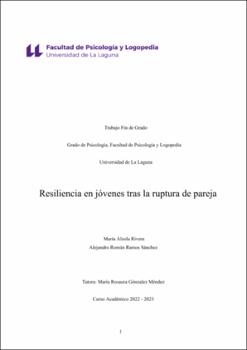Resiliencia en jóvenes tras la ruptura de pareja
Fecha
2023Resumen
Algunos estudios sugieren que los jóvenes adultos que provienen de hogares donde
los padres están separados muestran mayor nivel de inseguridad en sus relaciones románticas,
en comparación con los jóvenes cuyos padres seguían juntos. Por esta razón, este Trabajo de
Fin de Grado (TFG) tiene un doble objetivo. Por un lado, investigar la relación entre los
estilos de apego, el tipo de afrontamiento y la resiliencia frente a la ruptura de pareja en
jóvenes. Por otro lado, comparar dichos factores en jóvenes con padres que siguen juntos o
están separados.
Participaron 214 jóvenes entre 18 y 25 años (M = 21, DT = 1.50). De ellos, 93 tenían
padres separados y 121 juntos. En ambos grupos se observa que el apego ansioso se asocia
positivamente con el afrontamiento evitativo, mientras que la resiliencia lo hace con el apego
seguro, el afrontamiento directo y el afrontamiento buscando apoyo. La única diferencia
encontrada entre los grupos es que a mayor edad de los hijos durante el divorcio de los padres
se percibe mayor gravedad en las consecuencias emocionales y mayor cambio en cómo ven
las relaciones. Un análisis de regresión lineal múltiple indicó que el afrontamiento directo y
la búsqueda de apoyo en los demás, junto con el apego seguro, predicen la resiliencia. Some studies suggest that young adults who come from homes where parents are
separated report higher levels of insecurity in their romantic relationships, compared to young
people whose parents were still together. For this reason, our Final Degree Project (TFG) is
oriented to investigate the relationship between the attachment style during a relationship, the
type of coping and resilience in the breakup of a couple in young people, taking into account
the situation of the parents, that is to say if they are together or separated.
For this research, a sample of 214 young people between 18 and 25 years old has been
used (M = 21, TD = 1.50). Of them, 93 had separated parents and 121 together. In both
groups, it is observed that anxious attachment is positively associated with avoidant coping,
while resilience is positively associated with secure attachment, direct coping, and coping
seeking support. The only difference found between the groups is that the older the children
are during the parents' divorce, the more serious the emotional consequences are perceived,
and the greater the change in how they view relationships. A multiple linear regression
analysis indicated that direct coping and seeking support from others together with secure
attachment predict resilience.





